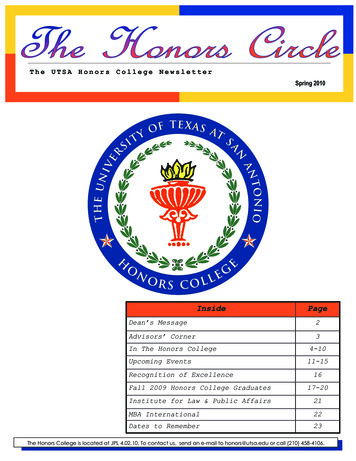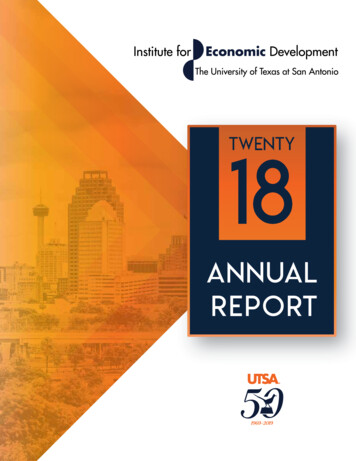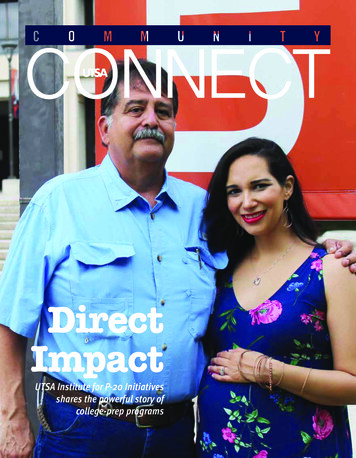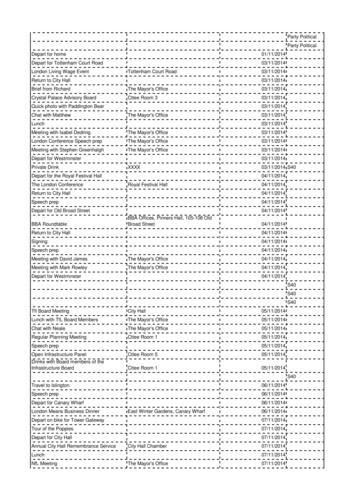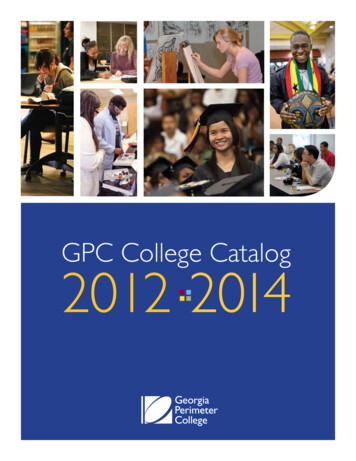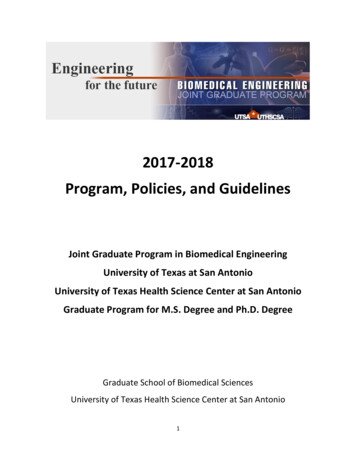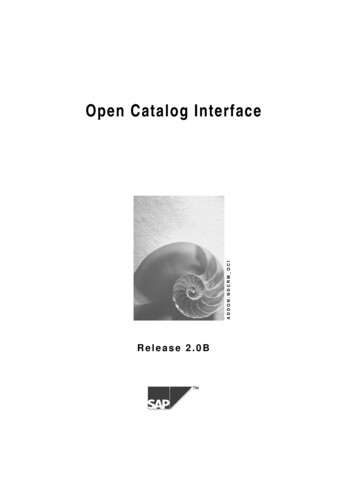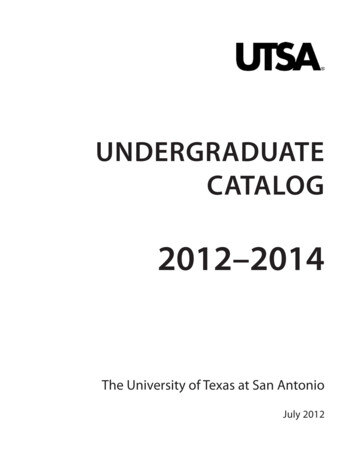
Transcription
UndergraduateCatalog2012–2014The University of Texas at San AntonioJuly 2012
The Alma Mater“Hail UTSA”From our hills of oak and cedarTo the Alamo,Voices raised will echoAs, in song, our praises flow.Hail Alma Mater!Through the years our loyalty will grow.The University of TexasSan Antonio.The MascotThe roadrunner, a bird representative of theTexas Hill Country and the Southwest,was voted the UTSA mascot in 1977.The School ColorsOfficial colors of The University of Texas Systemare orange and white. Upon recommendation fromthe UTSA Student Representative Assembly, theBoard of Regents approved the addition of blue tothe orange and white for UTSA’s school colors.utsa.eduThe provisions of this document do not constitute a contract,expressed or implied, between any applicant, student, or faculty member and The University of Texas at San Antonio or TheUniversity of Texas System. This document is a general information publication, and it does not contain all regulations that relateto students.The University of Texas at San Antonio reserves the right to withdraw courses at any time and to change fees, tuition, rules, calendar, curriculum, degree programs, degree requirements, graduationprocedures, and any other requirement affecting students. The policies, regulations, and procedures stated in this catalog are subject tochange without prior notice, and changes become effective whenever the appropriate authorities so determine and may apply to bothprospective students and those already enrolled. University policiesare required to be consistent with policies adopted by the Board ofRegents of The University of Texas System and are in compliancewith state and federal laws.Students are held individually responsible for meeting all requirements as determined by The University of Texas at San Antonioand The University of Texas System. Failure to read and comply with policies, regulations, and procedures will not exempt a student from whatever penalties he or she may incur.No person shall be excluded from participation in, denied the benefits of, or be subject to discrimination under any program or activitysponsored or conducted by The University of Texas System or anyof its component institutions on any basis prohibited by applicablelaw, including, but not limited to, race, color, national origin, religion, gender, age, veteran status, or disability. Discrimination on thebasis of sexual orientation is also prohibited pursuant to Universitypolicy.University publications: The UTSA Undergraduate Catalogprovides information about degrees offered by the undergraduatedepartments and lists the faculty. The chapter for each collegedescribes the degree requirements for all majors offered by thecollege and lists the college’s undergraduate courses. The UTSAInformation Bulletin (http://utsa.edu/infoguide/) gives importantinformation about academic policies and procedures that apply toall students, regardless of the catalog under which they are seekingtheir degree. It includes the official academic calendar, admissionprocedures, and residence requirements. The bulletin contains policies on grades and the grade point average, credit by examination,and scholastic probation and dismissal. This annual publication alsogives historical and current information about the University’s organization and physical facilities.Academic advising: UTSA views sound academic advising as asignificant responsibility in educating its students. Students areencouraged to seek academic advising to ensure that they completedegree requirements in an appropriate and timely manner. The partnership established with an academic advisor will assist studentswith learning about their options, degree requirements, academicpolicies and procedures, and appropriate University resources.This supportive, helpful relationship will enable students to planand pursue programs that support their interests and educationalgoals. Two centers provide academic advising for new and transfer freshmen (under 30 semester credit hours accepted by UTSA).With the exception of Honors freshmen who are advised by theHonors College, all freshmen who have decided upon a majorand UT-Austin Coordinated Admission Program (CAP) freshmenare advised through the Colleges’ Freshman Advising Center. Allfreshman, sophomore, junior, and senior students who have notdecided upon a major or have provisional status are advised throughthe Tomás Rivera Center for Student Success. Sophomore, junior,and senior students with college majors are advised on the Mainor Downtown campuses in the respective college advising centers based on college location. On the UTSA Downtown Campus,freshmen through seniors with declared majors should contact theDowntown Undergraduate Advising Center. Prospective studentscan seek information about UTSA academic programs from UTSA’sVisitor Center or New Student Admissions Office at either the MainCampus or Downtown Campus.The University of Texas at San Antonio is accredited by theCommission on Colleges of the Southern Association of Collegesand Schools to award baccalaureate, master’s, and doctoratedegrees. Contact the Commission on Colleges at 1866 SouthernLane, Decatur, Georgia 30033-4097 or call 404-679-4500 for questions about the accreditation of The University of Texas at SanAntonio.
Contents iiiContents1. Bachelor’s Degree Regulations. 2Degree Requirements. 2Core Curriculum. 2Minors. 6Bachelor of Applied Arts and Sciences. 6Transferring Courses. 7Enrollment in Graduate Courses. 9Graduation. 9Preprofessional Courses of Study in Law, Business, or Medicine. 102. Undergraduate Certificate Programs. 143. College of Architecture. 16Department of Architecture. 224. College of Business. 26Department of Accounting. 32Department of Economics. 34Department of Entrepreneurship and Technology Management. 38Department of Finance. 40Department of Information Systems and Cyber Security. 44Department of Management. 49Department of Management Science and Statistics. 55Department of Marketing. 635. College of Education and Human Development. 68Department of Bicultural-Bilingual Studies. 72Department of Counseling. 84Department of Educational Leadership and Policy Studies. 84Department of Educational Psychology. 84Department of Health and Kinesiology. 84Department of Interdisciplinary Learning and Teaching. 926. College of Engineering.106Department of Biomedical Engineering. 108Department of Civil and Environmental Engineering. 111Department of Electrical and Computer Engineering. 114Department of Mechanical Engineering. 1197. College of Liberal and Fine Arts.124Department of Anthropology. 124Department of Art and Art History. 127Department of Communication. 132Department of English. 135Department of History. 142Department of Modern Languages and Literatures. 147Department of Music. 153Department of Philosophy and Classics. 158Department of Political Science and Geography. 163Department of Psychology. 171Department of Sociology. 174UTSA 2012–2014 Undergraduate Catalog
iv Contents8. College of Public Policy.178Department of Criminal Justice. 178Department of Demography. 179Department of Public Administration. 180Department of Social Work. 1829. College of Sciences.184Department of Biology. 184Department of Chemistry. 191Department of Computer Science. 194Department of Geological Sciences. 196Department of Mathematics. 202Department of Physics and Astronomy. 20610. Office of Undergraduate Studies.21211. Honors College.22212. Course Descriptions.228AppendicesA. UTSA Faculty. 405B. Texas Common Course Numbering System. 427C. National Standardized Tests: Minimum Scores Required for Credit at UTSA. 431Index.437UTSA 2012–2014 Undergraduate Catalog
Bachelor’s DegreeRegulationsContentsDegree Requirements 2Overall Requirements 2Minimum UTSA Residence Requirements 2Core Curriculum 2Transfer of Core Curriculum Courses 2Resolution of Transfer Disputes for Core Curriculum Courses 3Goals of the Core Curriculum 3Expectations for Entering Students 3Core Curriculum Component Area Requirements 3Communications 3Mathematics 3Natural Sciences 4Humanities & Visual and Performing Arts 4Social and Behavioral Sciences 4World Society and Issues 5Catalog of Graduation 6Multiple Degrees 6Pursuing One Degree Covering More Than One Major 6Pursuing Two Degrees Concurrently 6Pursuing Additional Degrees after Graduation 6Minors 6Bachelor of Applied Arts and Sciences 6Transferring Courses 7Evaluation Procedures 7Resolution of Transfer of Credit Disputes 7Course Types and Acceptability 7Enrollment in Graduate Courses 9For Undergraduate Credit 9For Graduate Credit 9Graduation 9Graduation Dates 9Applying for the Degree 9Applying for a Certificate 10Graduation with University Latin Honors 10Preprofessional Courses of Study in Law, Business, or Medicine 10Preparation for Law School 10Preparation for Graduate Study in Business 10Preparation for Health Professions Programs 111
2 Bachelor’s Degree Regulations1. Bachelor’s Degree RegulationsDegree RequirementsOverall RequirementsIn order to receive a bachelor’s degree from UTSA, a student mustmeet these minimum requirements:1. Complete a minimum of 120 semester credit hours, at least 39 ofwhich must be upper-division level.2. Complete the University Core Curriculum requirements outlined in this chapter.3. Complete at least one course in the University Core Curriculumdesignated as a Q-course to satisfy the Quantitative Scholarshiprequirement.4. Complete the major and support work requirements and the freeelective requirements for the desired degree. Free electives referto any semester credit hours accepted by UTSA in transfer orawarded by UTSA that, for degree purposes, are not applied toCore Curriculum, major, minor, or support work requirements.The only restrictions placed upon courses used as free electivesare as follows:a. that a specific number of free elective credits must be at theupper-division level for some degree programsb. that a maximum of 6 semester credit hours of physical activities courses can be applied to the free electives allowed forany UTSA degree programc. that a maximum of 9 semester credit hours of military sciencecan be applied to the free electives allowed for any UTSAdegree program.5. Meet all requirements for a degree as put forth by the Texas StateEducation Code, including the following:a. All students must complete 6 semester credit hours ofAmerican or Texas history.b. All students must complete 6 semester credit hours of government or political science, including the Constitution ofthe United States and constitutions of states, with special emphasis on Texas.6. Meet the minimum UTSA residence requirements.7. Achieve an overall 2.0 grade point average in all work attemptedat UTSA and a 2.0 grade point average in all work included inthe major.8. Be in good academic standing at UTSA.9. Apply formally for the degree before the deadline in the Officeof the Registrar.Minimum UTSA Residence RequirementsThe following minimum UTSA residence requirements are inac cor d ance with requirements established for all institutions in TheUniversity of Texas System and are requirements for all bachelor’sdegrees:1. A minimum of 25 percent of the total number of semester credithours required for a bachelor’s degree must be completed atUTSA before a degree can be conferred.2. Twenty-four of the last 30 semester credit hours applied tothe degree program must be completed in residence, with theexception that among University of Texas System components,a student may, with the approval of the appropriate dean, transfer additional coursework to the program at the degree-grantinginstitution.3. Of the minimum 39 upper-division semester credit hoursrequired in all degree programs, 18 must be earned in UTSAcourses.4. At least 6 semester credit hours of upper-division coursework inthe major must be completed at UTSA. Additional hours in themajor sequence may be required under individual UTSA degreeplans.Core CurriculumThe Core Curriculum is the part of each student’s degree programin which he or she takes courses that meet requirements commonto all UTSA undergraduates. Candidates for a bachelor’s degreemust achieve core objectives by completing the Core Curriculum.To meet the Quantitative Scholarship requirement, all candidates fora bachelor’s degree must complete at least one course in the CoreCurriculum designated as a Q-course in the Schedule of Classes.Transfer of Core Curriculum CoursesIn accordance with the Texas Education Code, Chapter 61, Sub chapter S, the UTSA Core Curriculum consists of 42 semester credithours of coursework. If a student successfully completes the entirecore curriculum at another public institution of higher education inTexas, that block of courses may be transferred to any other publicinstitution of higher education in Texas and must be substituted forthe receiving institution’s core curriculum. Students will receiveacademic credit for each of the courses transferred and may not berequired to take additional core curriculum courses at the receivinginstitution unless the Texas Higher Education Coordinating Boardhas approved a larger core curriculum at that institution.Students who have completed a portion of the Core Curriculum atanother Texas public institution of higher education may use thatcoursework to satisfy UTSA Core Curriculum requirements if: the course is designated as meeting a Core Curriculum requirement at the institution, andthe course fits within the UTSA Core Curriculum.For transfer purposes, the designated Texas Common CourseNumbering (TCCN) System courses will be accepted in transfer inlieu of these courses.Students should consult with an academic advisor to determine thesequence of courses in the Core Curriculum and the major.Students who have successfully completed the entire core curriculum at another public institution of higher education in Texaswill be required to complete at least one Q-workshop to meetUTSA 2012–2014 Undergraduate Catalog
Degree Requirements 3the Quantitative Scholarship requirement. Q-workshops will bescheduled at different times during the academic year.Resolution of Transfer Disputes for Core CurriculumCoursesPublic institutions of higher education must follow these proceduresin the resolution of credit transfer disputes involving lower-divisioncourses:1. If an institution of higher education does not accept course creditearned by a student at another institution, the receiving institution will give written notice to the student and to the sendinginstitution that the transfer of course credit is denied. At therequest of the sending institution, the receiving institution willalso provide written notice of the reasons it denied credit for aparticular course or set of courses.2. A student who receives notice may dispute the denial of creditby contacting a designated official at either the sending or thereceiving institution.3. The two institutions and the student shall attempt to resolve thetransfer of the course credit in accordance with Texas HigherEducation Coordinating Board rules and guidelines.4. If the transfer dispute is not resolved to the satisfaction of thestudent or the sending institution within 45 days after the datethe student received written notice of denial, the institution thatdenied the course credit for transfer will notify the Commissionerof Higher Education of its denial and the reasons for the denial.5. The commissioner or the commissioner’s designee will makethe final determination about the transfer of course credit andgive written notice of the determination to the involved studentand institutions.The Texas Higher Education Coordinating Board will collect dataon the types of transfer disputes and the disposition of each case thecommissioner considers.If a receiving institution believes that a course which a student presents for transfer is not of acceptable quality, it should first contactthe sending institution and try to resolve the problem. If the twoinstitutions cannot come to a satisfactory resolution, the receivinginstitution may notify the Commissioner of Higher Education, whomay investigate the course. If its quality is found to be unacceptable,the Texas Higher Education Coordinating Board may discontinuefunding for the course.Goals of the Core CurriculumThe Core Curriculum reflects the educational goals of theUniversity. It is designed to enable students to assess the perspectives and accomplishments of the past and to move to the future withan informed and flexible outlook. It promotes intellectual adaptability, ethical awareness, and transfer among diverse modes of thought.An essential aim of the Core Curriculum is to cultivate the verbal,numerical, and visual skills necessary to analyze and synthesizeinformation, construct arguments, and identify and solve problems.Another essential aim is to foster understanding of the intellectualand cultural pluralism of modern society as it is reflected in naturalscience and mathematics; behavioral, cultural, and social science;and literature and artistic expression. By encouraging interdisciplinary study, the Core Curriculum seeks to develop critical awarenessof the continuities and discontinuities of human thought, history,and culture, thus helping prepare students to meet the demands ofchange.The University has recently added a quantitative scholarship requirement designed to enhance quantitative reasoning and critical thinking skills. In keeping with the educational goals of the University,this requirement will help students understand and evaluate data,assess risks and benefits, and make informed decisions in all aspectsof their lives.The University reviews Core courses for their success in promoting the goals of the Core, and it encourages students to select Corecourses that will best achieve these goals. Beyond the Core, eachstudent must fulfill the requirements of a major.Expectations for Entering StudentsThe Core Curriculum is built on the assumption that the foundations of the general part of a student’s education are laid in secondary school. Appropriate levels of proficiency in important subjectshave been established as prerequisites for many of the courses inthe Core, especially in the areas of rhetoric, mathematics, and language. Students who are unable to demonstrate proficiency may berequired to take additional coursework before qualifying to takecourses that meet Core Curriculum requirements. Entering studentsare also expected to possess proficiency in reading, knowledge ofresearch and library tools, and a familiarity with basic computerskills. Students unable to demonstrate such proficiency and knowledge may be required to enroll in noncredit programs developed byUTSA to correct deficiencies in these areas.Core Curriculum Component Area RequirementsCommunications (010) (6 semester credit hours)To achieve the objectives of the Communications component area,students must demonstrate competent writing in English; criticalproficiency in oral and graphic communication; competence inconstructing valid arguments and criticizing arguments; and criticalproficiency in using diverse theoretical perspectives to identify andformulate problems and draw conclusions.Students must complete the following courses, for a total of 6semester credit hours:English Rhetoric/CompositionWRC 1013WRC 1023Freshman
UTSA 2012–2014 Undergraduate Catalog 2 Bachelor’s Degree Regulations 1. Bachelor’s degree regulations 2. Twenty-four of the last 30 semester credit hours applied to the degree program must be completed in
